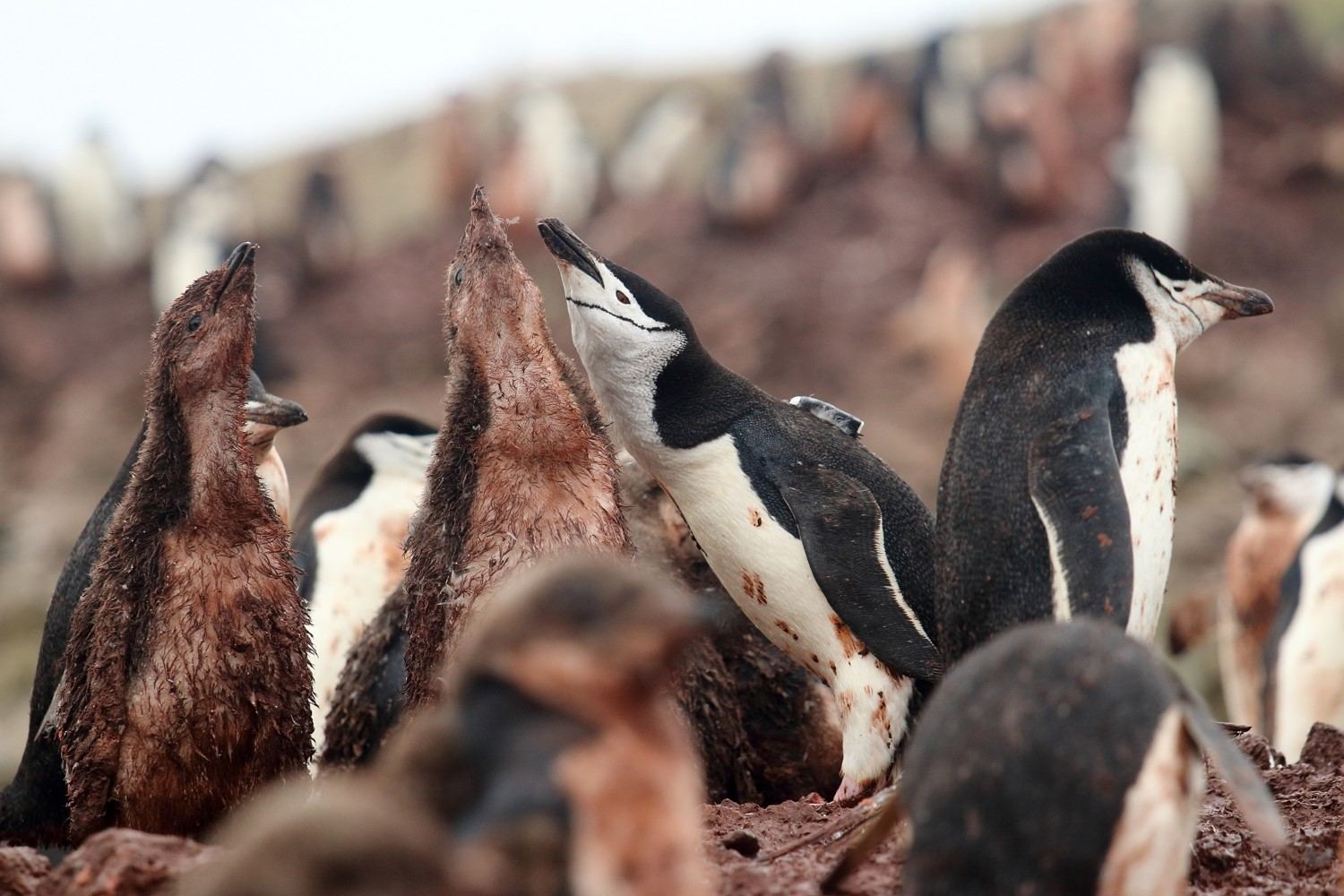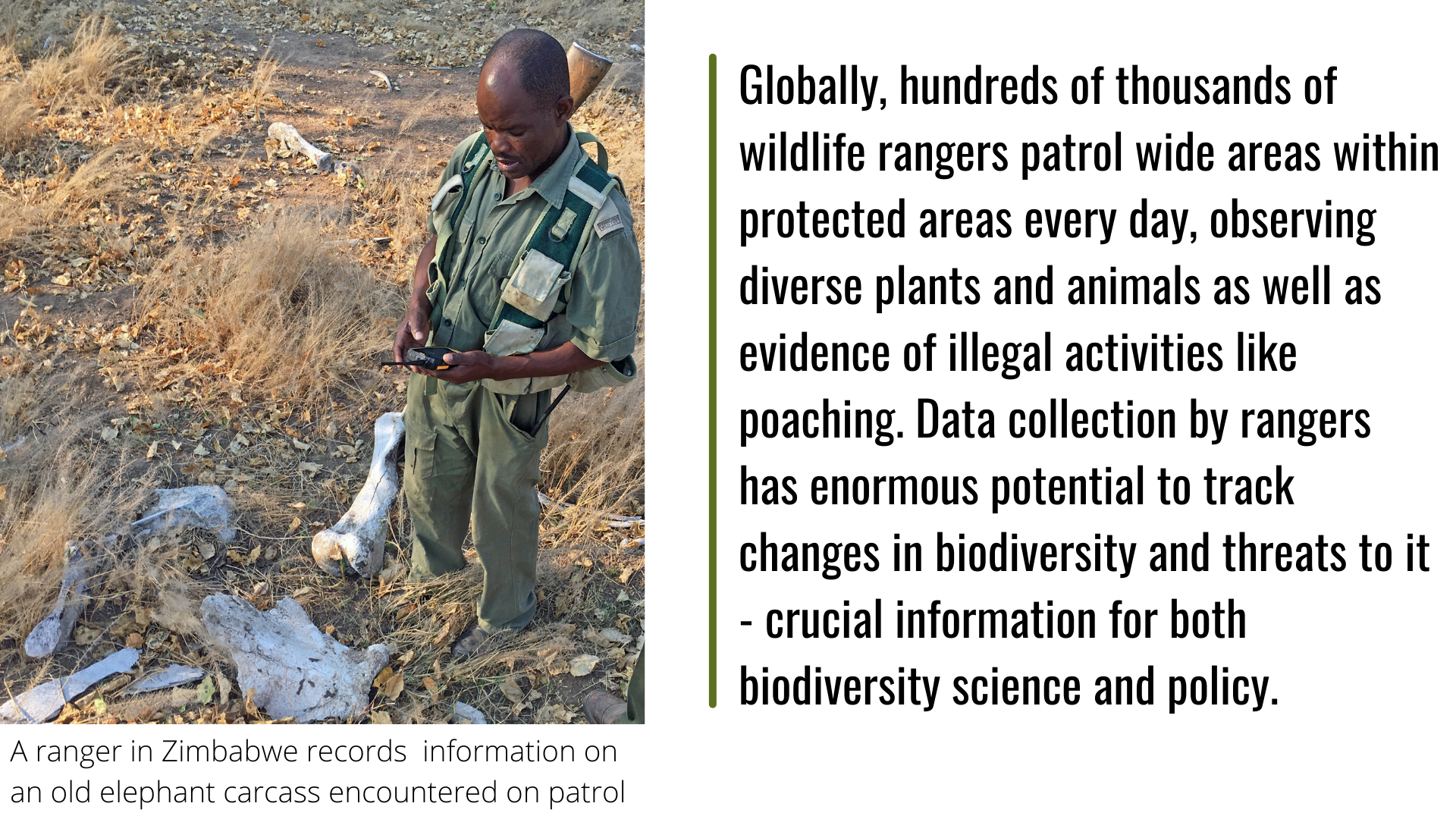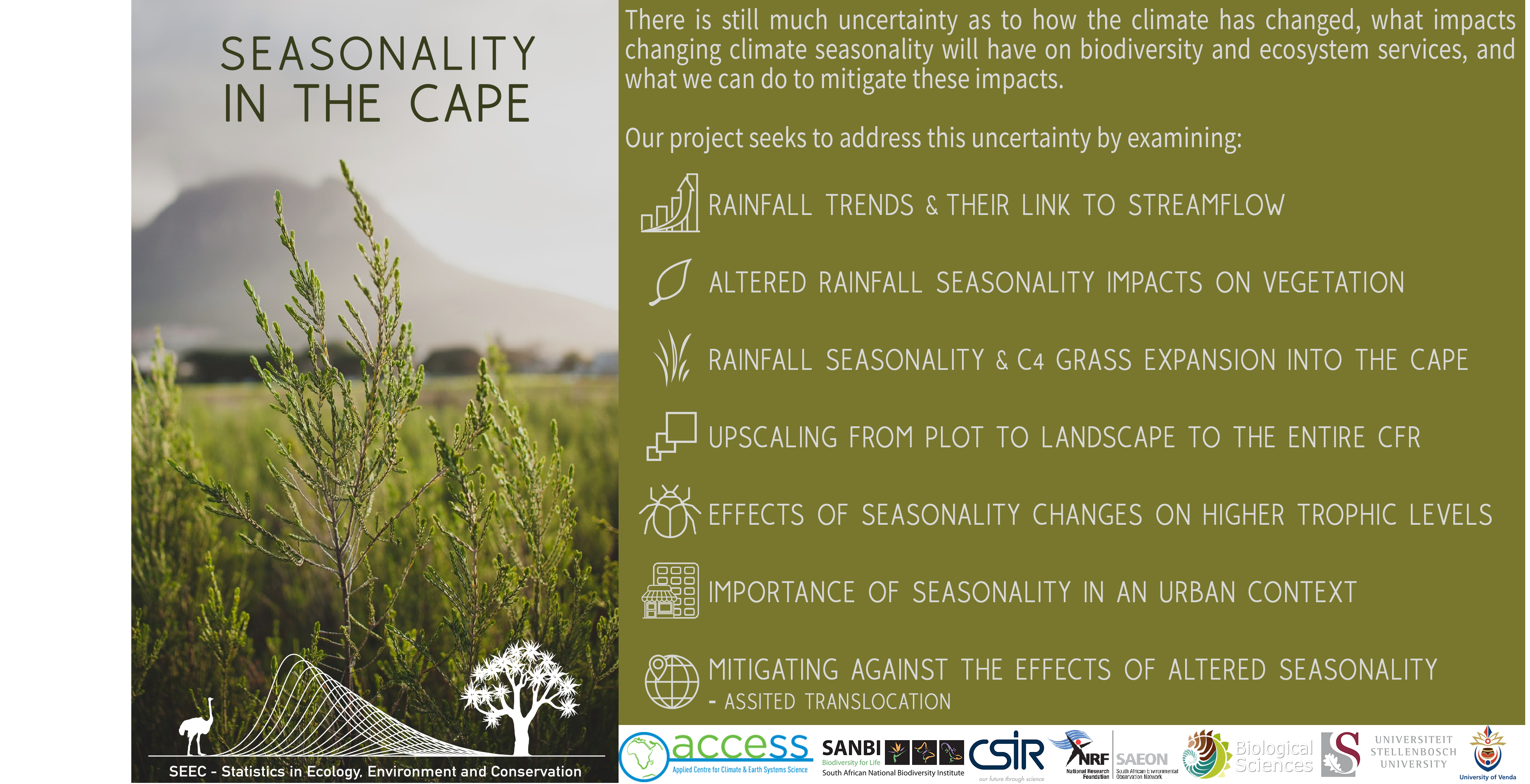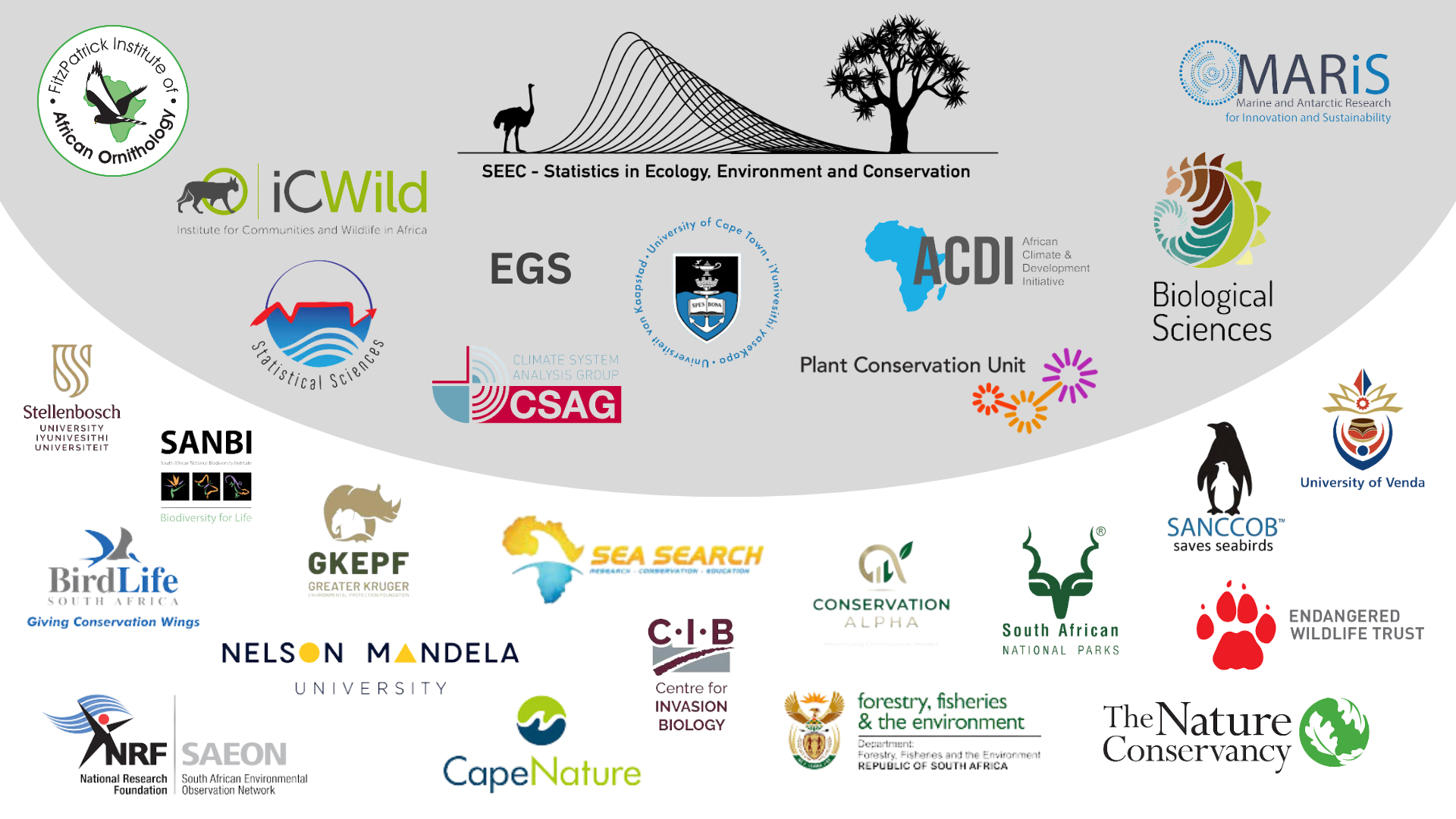SEEC research projects aim to provide a quantitative understanding of environmental processes based on the best available statistical methods used in structured decision-making situations. View our current project list below. If you are interested in engaging or collaborating, don't hesitate to get in touch with us.
Current Projects
The Biodiversity Survey of the Cape (BioSCape) is BioSCape is a research project that uses remote sensing and field data to understand the distribution, function, and importance of biodiversity on land and in the water in the Greater Cape Floristic Region (GCFR), one of the world’s 36 biodiversity hotspots.
Ecoforecast Africa’s mission is to build a community of practice around near-term iterative ecological forecasting in Africa, aiming at improving our fundamental understanding of African ecosystems and translating that knowledge into tools to assist their management and conservation.
The EMMA project is building new tools to monitor the health of shrubland ecosystems in near real-time. Focusing on the fire-prone Cape Floristic Region of South Africa—a biodiversity hotspot—our system combines satellite data, field observations, and modeling to track changes in vegetation, identify threats like fires or invasive species, and support better conservation decisions. In partnership with the South African Environmental Observation Network (SAEON), EMMA aims to provide reliable, up-to-date information that helps protect these critical landscapes.
The Spatial Biodiversity Assessment, Prioritization, and Planning (SBAPP) Regional Project aims to build biodiversity knowledge for action in Southern Africa through Spatial Biodiversity Assessment, Prioritization, and Planning in South Africa, Namibia, Mozambique, and Malawi. Objective 4 of the project is to develop national spatial databases on ecological condition or land degradation for each of the four partner countries.
Anthropogenic pressures such as climate change and harvesting have led to declines in many Southern Ocean marine predator populations, eliciting concern about their demographic persistence and the indirect ecological consequences that predator depletions may have on marine ecosystems. However, there is still much uncertainty about the drivers of population change among marine predators breeding in the Antarctic and sub-Antarctic.
Foraging behaviour and functional responses of penguins
This project aims to develop monitoring indices that can quantify and characterize functional responses of penguins to changes in their prey field. We collect and analyse GPS-TDR-Accelerometer and animal-borne video data from chinstrap- and other pygoscelis penguins breeding in West Antarctica. This work will contribute to managing the harvest of Antarctic krill, to ensure the long-term sustainability of the krill fishery and the marine ecosystem, including krill-dependent predators such as seals, penguins and whales. This is a collaborative project with the Norwegian Polar Institute and other partners.
Population dynamics of southern elephant seals
This project investigates the demographic drivers of realized population growth rates of southern elephant seals at Marion Island, making use of nearly 40 years of capture-recapture and population count data, and integrated population models. This work is in collaboration with the Marion Island Marine Mammal Programme at the University of Pretoria.
For more information on Southern Ocean Marine Predator Ecology projects, please contact Chris Oosthuizen (chris.oosthuizen@uct.ac.za).

Timothy Kuiper (Postdoctoral Research Fellow) and Res Altwegg (Advisor)
Biodiversity conservation still lags healthcare and social policy in terms of a robust evidence base of what does and does not work to stem biodiversity loss, and existing evidence is not well translated into action. This project seeks to leverage a unique source of biodiversity evidence: the data that rangers collect on patrol.
We will build upon 4 years of foundational research and policy work on ranger-based monitoring of elephant poaching in Zimbabwe. We have identified two key challenges. First, rangers do not patrol all areas and times equally, and don’t always have the resources to patrol widely, so their data can be biased and difficult to interpret. Second, protected area managers may not have the time, tools, or buy-in to analyse ranger-collected data to inform their management actions.
Our research aims to address these challenges by using novel statistical tools to analyse ranger-collected data, while also developing tools for translating trends in ranger-collected data into simple and actionable evidence to guide management decisions. Our current/planned case studies for the two-year project period include ranger-based monitoring of bushmeat hunting (Zimbabwe), elephant poaching (an Africa-wide dataset), and rhino-poaching (South Africa).

Past Projects
Climate change, particularly seasonal changes, are likely to have much larger impacts in the Greater Cape Floristic Region compared to the rest of the world. However, there is still much uncertainty as to how the climate has changed, what impacts changing climate seasonality will have on biodiversity and ecosystem services, and what we can do to mitigate these impacts.
Our project seeks to address this uncertainty by examining:

For more information on these projects, please contact the relevant project leads:
- Rainfall trends & their link to streamflow (Birgit Erni)
- Altered rainfall seasonality impacts on vegetation (Adam West)
- Rainfall seasonality and C4 grass expansion into the Cape (Vernon Visser)
- Upscaling from plot to landscape to the entire CFR (Jasper Slingsby & Adam West)
- Effects of seasonality changes on higher trophic levels (Birds - Res Altwegg; Invertebrates - Stefan Foord)
- Importance of seasonality in an urban context (Pippin Anderson)
- Mitigating against the effects of altered seasonality – assisted translocation (Guy Midgley)
The NRF-funded RReTool project focused on developing Rapid and Repeatable tools for monitoring and mitigating global change impacts on natural resources in South Africa, predominantly using remote sensing.
Collaborations
SEEC collaborates with a diverse network of groups within the University of Cape Town and across South Africa, bringing together interdisciplinary expertise to address complex ecological and environmental challenges.

